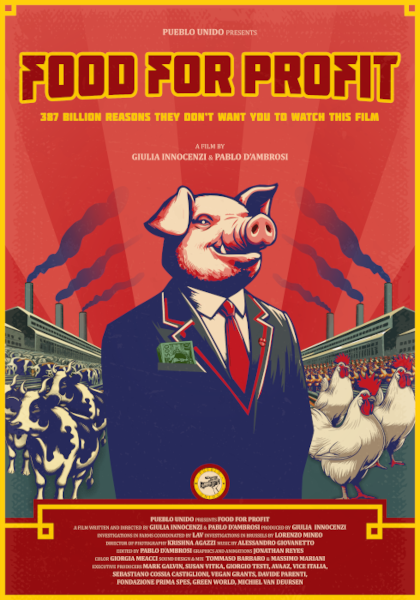
Last night, as I was walking out of the cinema where I had just watched Food for Profit, I could not help but think about the people around me. It is pretty easy to say that maybe I am not the kind of person Innocenzi’s and D’Ambrosi’s documentary aims at. Why would I need an investigation such as this to move me towards ethical choices that by now I have already been following for over ten years? And yet, beside supporting this much too necessary endeavor, I was curious to sit in a room with other people and sense the impact its images would have on eyes possibly not accustomed to the reality of intensive farming.
Let me start by simply saying that if one cares in any way about the world we live in, then they should not ignore this work. Furthermore, at the moment in Italy it is nearly impossible not to find a screening. Its authors have been literally reaching every corner of this country to make sure everyone has a chance to see the results of their five-year long effort. Considering that this is an independent film which relies on word of mouth, because big producers and giant distributors have no interest in alienating the meat industry, Innoncenzi’s and D’Ambrosi’s willingness to share what they believe in is absolutely remarkable.
However, I had my misconceptions about the film. Somehow I was expecting it to be solely criticism about European agricultural politics, as if the whole point of the documentary was to expose politicians not behaving as one would suppose, which would have been barely a surprise nowadays. This is only a part of what Innoncenzi and D’Ambrosi do, though. They cannot and do not want to hide the inevitable consequences of what some inept members of the European Parliament agree upon. Animal suffering, diseases, environmental disasters, exploitation of workers: it is all here in its vivid, horrific evidence.
After what I learnt from Earthlings and Dominion, I should be used to mindless violence, but the shock always manages to unsettle me, just as it always takes me a moment to recover from the fact that we seem incapable of treating animals and other people with the same principles of humanity we believe to have perfected over the course of history. Food for Profit acts as a powerful reminder of how we constantly and comfortably forget those principles in order to enjoy privileges that we choose not to question. As Innocenzi said to us at the end of the screening, we usually expect documentaries such as this from the US. It is about time Europe comes to terms with the same atrocities that we like to think are far way from us.
This is what one should really focus on as they watch the film. I can hardly trust critics who pick at Innoncenzi for posing herself in a sort of egocentric, Michael Moore-like kind of way.1 On the contrary, I believe that she needs to put herself right within these images and back them as strongly as she can. She has every right to use her public persona to engage with viewers, because I do not see this work as art for art’s sake, nor I see any point in approaching it with the dissecting eye of a film critic. There is simply too much at stake in this documentary to look at it with questionable, rational detachment or reductionist arguments.
And this is why last night I found people’s reactions more honest and important than any critique. We were all shaken by the cruelty and the indifference we had witnessed, but I was genuinely surprised by the sincere concern many showed at the end. Innocenzi kindly replied to all the questions, most of which dealt with what can we do now, what is actually feasible and what, if any, are the hopes for a better world. If one, like me, finds it really difficult to believe that the planet and whoever lives on it can put up with human actions any longer, people’s response to Food for Profit will be enough to placate the heart for a while.
-
See Matteo Marelli’s “review” on FilmTv. The cheap scepticism used to dismiss the actual point of Food for Profit tells me more about Marelli than the film itself. ↩︎